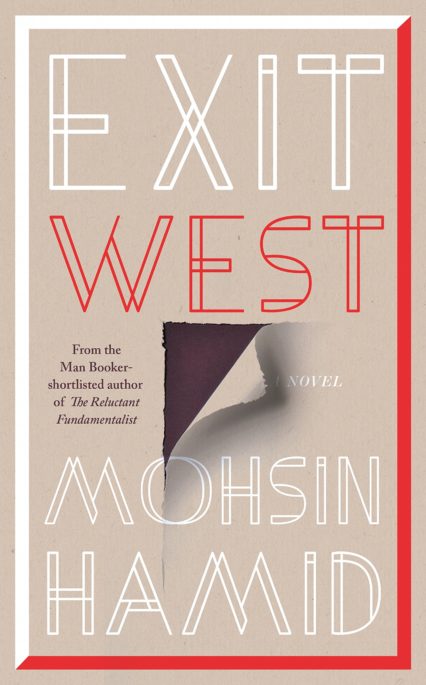Following on from the success of The Reluctant Fundamentalist, Rabeea Saleema finds much to admire in Mohsin Hamid’s latest novel, Exit West.
Mohsin Hamid has a knack for writing penetrating and prescient novels. In Reluctant Fundamentalist he shrewdly depicts the cultural and social struggles of Pakistanis in a post 9/11 world and in How to Get Filthy Rich in Rising Asia, he tackles the creeping issue of rural immigration in rapidly developing Asia. With his latest work, he turns his attention to one of the biggest crisis of our times – immigration.
Exit West is the story of a courtship amidst chaos. It is set in an unnamed place which resembles one of the present war-riddled Middle eastern countries. Saeed and Nadia meet, sparks fly and just as the tension in their city intensifies, so does their mutual desire.

The overall atmosphere is frenzied, pulsating with tension and volatility as the city spirals down into turmoil. Hamid unflinchingly illustrates the unpredictability of going about your day-to-day business in the thick of civil unrest – living on constant tenterhooks, never knowing what is going to happen to you or your closed ones in the next minute or the next day.
As their city teeters into civil war, Hamid minutely captures how incremental and creeping this process of disintegration is. They are gradually stripped of each of their privileges and basic human rights since they can’t even move freely for fear of persecution or worse. Relatives disappear and lives of loved are abruptly cut short, as is the case with Saeed’s mother who is hit by a stray bullet while in the car.
Soon the situations turns so dire that they are forced to look for escape routes. Rumours abound about mysterious doors which open into strange lands, providing refuge to people seeking to escape their perils. Saeed’s father refuses to go because unlike the couple’s youthful optimism, he knows there is no substitute for home and he would rather die and be buried near his wife than worry about self preservation.
The elements of magical realism come into play with these enigmatic doors about which he says
It was said in those days that the passage was both like dying and being born, and indeed Nadia experienced a kind of extinguishing as she entered the blackness…
The doors stand as a metaphor for immigration itself which means inevitably casting aside your old self. You are not just leaving a place, you are leaving a part of your personality, cleaving old attachments to forge new ones. Along the way Saeed and Nadia encounter labor camps and refugee shelters and the narration subtly delineates how humans inherent prejudices against other religions and races manifest themselves, even when they are all on the same side.
Saeed and Nadia flee their native land, trading one refuge with another, each just as hostile to migrants like them as the next until they end up in London. They are not alone in this perpetual search for home after having uprooted their lives. The city is soon teeming with displaced persons because of the hoards of refugees coming through. London is now swarming with immigrants, much to the growing concern of locals some of whom give in to jingoistic protests. In this vein, Hamid addresses the very timely issue of rabid nativism prevalent these days.
Exit West tracks the emotional trajectory of Saeed and Nadia’s relationship as they look for refuge. It says something about how when we leave a place, we shed our old self behind. As they adjust to novel, tough situations with a different set of challenges, it tests their relationship and brings to the fore their clashing viewpoints, replacing the naive infatuation they first had for each other. What started as a malleable relationship soon turns brittle owing to their rapidly changing circumstances.
They have sacrificed and lost so much in their lives while fleeing for safety that it invariably affects their equation with one another. Hamid sensitively delineates how movement and resettling chips away at our sense of self, inevitably leading us to re-calibrate our bonds with people around us.
I liked how Exit West realistically portrays relationships. Mostly it is said that hardships strengthen bonds and unite people but the longevity of such bonds are rarely explored. This story searingly shows how extraneous factors can fracture relationships irrevocably. The same happens with Saeed and Nadia – they drift apart but rather than being dramatic, this process is entirely gradual and organic, a sharp contrast to their violent and abrupt departure from Saeed’s father and their homeland earlier in the story.
While the lyrical realism works for the most part, I felt that at times, the multi-clause sentences hindered the simple effectiveness of the story. Even though it is a slim novel, it took me a while to really get into it but I still felt that the first half of the story packs more of a punch than the latter half. It has a lot to do with the introduction of several minor characters who are supposed to signify the plights of migrations from eclectic backgrounds. They did not add much to the story, only diluting the impact of the couple’s story at the center of this novel. The story pacing was uneven at times but eventually result in an elegiac and bittersweet novel about fragility of human relationships in times of crisis. Exit West is a transcendent story which has a very ethereal universality, implied by the writer’s decision to leave the place and most of the auxiliary characters unnamed. This elegantly written novel movingly studies the emotional and psychological toll of migration on two people and how this inexorably changes their lives.
Exit West is published by Hamish Hamilton










